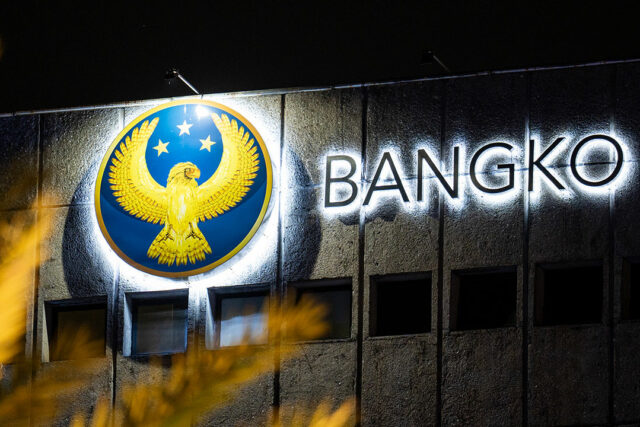SEIPI eyes modest exports growth

By Justine Irish D. Tabile, Reporter
THE Semiconductor and Electronics Industries in the Philippines Foundation, Inc. (SEIPI) is hoping to see at least a modest growth in exports this year as more investments are expected to come in amid improved incentives and lower US tariffs.
“We have contracted for two years in a row. Now we have projected flat growth, but we are optimistic that we might see some modest growth,” SEIPI President Danilo C. Lachica told reporters on the sidelines of an event on Friday.
“It could be a single-digit growth, maybe 1-2% growth, just not flat,” he added.
Electronic products were the top commodity export of the Philippines last year, accounting for 53.4% of its total exports.
In 2024, the Philippines exported $39.1 billion of electronic products, down 6.7% from $41.91 billion a year prior.
Mr. Lachica said that the sector is quite optimistic this year as there is growing interest from foreign firms to locate in the Philippines due to the Corporate Recovery and Tax Incentives for Enterprises to Maximize Opportunities for Reinvigorating the Economy (CREATE MORE) Act.
“There was a lot of interest because CREATE MORE is a big upgrade… but the first thing to overcome is if the country we will go to knows about the Philippines, so we have to advertise our country,” he said.
“And then the second thing is… we need to show improvements in our operating costs, whether that is power or logistics.”
However, he said even if investments are much higher, it will not translate to an increase in manufacturing exports immediately.
“But the good thing is, you’re fueling the growth engine with these investments, which will eventually generate employment and generate the supply chain. So, we’re looking forward to that,” he added.
At the same time, Mr. Lachica said that the 17% tariff rate to be imposed by the US could encourage some companies in other countries with higher tariffs to look at the Philippines for expansion.
Philippine exports to the US face a 17% tariff, the second lowest among Association of Southeast Asian Nations (ASEAN) member countries after Singapore’s baseline rate of 10%. The higher tariff has been suspended until July.
“While we’re enjoying that sweet spot, what’s concerning is the intrinsic value of our exports. We’re in the back-end assembly test and packaging. That’s why my hope is to see a commercial wafer fab,” he said.
SEIPI previously proposed to the government the establishment of a lab-scale wafer fab, which is estimated to cost around $10 million.
“A lot of people still believe that we do not need a wafer fab… Our proposal is a tabletop wafer lab [because] we are trying to grow our integrated circuit design industry,” he said.
“We need a government agency to help us out, someone who understands. And then, it’s going to be a combination of government funding and bank funding,” he added.
According to Mr. Lachica, SEIPI will be sending a proposal to the Department of Science and Technology as early as the end of May.
While the 17% tariff is lower compared with those imposed on other ASEAN members, Mr. Lachica said the Philippines should still negotiate a lower rate.
“We want to work on reducing it further. Because… we don’t know if it’s going to remain at 17%. When all is said and done after negotiations, maybe later other countries will even out,” he said. “That’s why we cannot leave anything on the table. We have to take this opportunity sooner rather than later to negotiate.”
Trade Secretary Ma. Cristina A. Roque and Special Assistant to the President for Investment and Economic Affairs Frederick D. Go will be in Washington from April 29 to May 2 for tariff talks with their US counterparts.
Mr. Lachica said the Philippines will have to tread carefully as the electronic sector imports 30% of its raw materials from China.
“If China is slapped with an exorbitantly high tariff, then their form of retaliation might be holding back on materials that they export. For example, the rare earth and rare metals, already one of our members cannot get their supply of magnets,” he said.
“So, if this escalates, the 30% we import from China might be severely impacted,” he added.
If it happens, he said that the Philippines will have to develop other sources.
Aboitiz InfraCapital Head of Economic Estates Rafael Fernandez de Mesa said that the tariffs will bring uncertainty and volatility, which could be “good for the Philippines.”
“Why do I think it’s good? Because as a business, you are trying to manage that risk and that volatility, and in an industrial sector where it’s really a global landscape, you need to have your risk diversified, and that’s where the Philippines comes into play,” he told a panel discussion.
“In a world of uncertainty and volatility, I think there’s going to be more movement towards the Philippines. That’s what we’re starting to see over the month and a half: renewed and more accelerated interest,” he added.







 With a sustained commitment to quality life insurance that champions all Filipinos, Cocolife plans to expand their life insurance products and services to underserved regions and demographics.
With a sustained commitment to quality life insurance that champions all Filipinos, Cocolife plans to expand their life insurance products and services to underserved regions and demographics.





